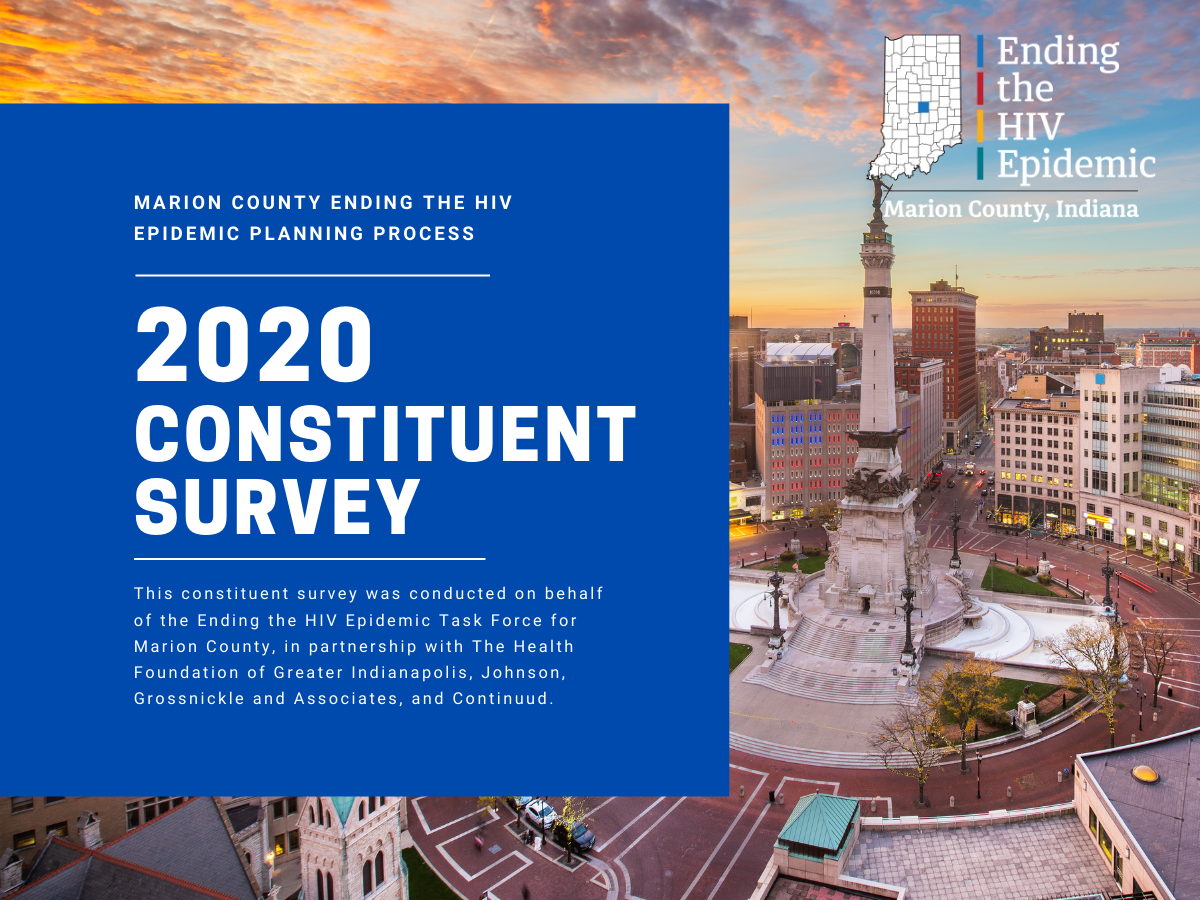Developing The Plan
Needs Assessment & Consultation Approach
Overview
The EHE needs assessment and consultation process in Marion County was developed with input from the newly formed 47-member EHE Task Force and from the Indiana Department of Health (IDOH) in consultation with the Marion County Public Health Department (MCPHD).
The first step in the needs assessment process was to compile and review existing documents, including the 2016 Integrated HIV Plan for the State of Indiana, the 2019 HIV epidemiology data for the Indianapolis Transitional Grant Area (TGA) the 2019 IDOH PLHIV Needs Assessment, and other relevant state and county plans and documents. The Health Foundation and JGA then worked together and with the Task Force, IDOH and MCPHD to identify an extensive list of stakeholders and informants to contact and involve in the 2020 needs assessment and consultation process.
JGA then designed and implemented a three-tiered data collection protocol to include both qualitative and quantitative information gathering. The protocol included individual interviews, focus groups, and two separate survey instruments. An important part of the methodology for the data collection included regular convening of the EHE Task Force to provide guidance and input throughout the process.
Individual
Interviews
On the qualitative side, JGA conducted individual interviews with 52 stakeholders within Marion County. The interviewees included those traditionally included in the HIV services arena as well as others who work in support services, faith-based communities, and organizations that address social determinants of health. This group intentionally included several stakeholders who are considered potential new partners in the EHE effort. JGA used a semi-structured appreciative inquiry approach, which ensured that a consistent set of questions was used in each meeting, while still focusing on topics and themes relevant to the interest and expertise of individual interviewees. The interviews were conducted by two consultants who then synthesized the notes to compile and document common themes.
Focus Groups
JGA then conducted 26 focus groups with 120 participants, with a broad cross-section of provider groups, people with lived experience, and people in at-risk populations. The focus groups provided opportunities for an in-person, interactive group dynamic, resulting in important discussions, observations and insights. Participants were intentionally recruited across 26 defined networks in a variety of roles, organizational affiliations, neighborhoods and communities and demographics, through leading providers and community organizations, as well as independent outreach. Facilitators were matched with each group based on its composition, yet there was one single PhD researcher who took the notes for all of the focus groups in order to provide continuity and to synthesize all of the input.
Provider Survey
JGA then conducted a survey of 37 organizations in Marion County receiving HIV-related funding, with a significant outreach aiming to engage nearly all providers, including several potential new providers. Questions were related to the four EHE pillars and intersectional issues, encouraging expression of thoughts and opinions, which resulted in a good affirmation and mapping of providers engaged in the HIV effort.
Consumer and Expert Survey
To round out the data collection, JGA completed the largest HIV survey in the known history of HIV work in Marion County. This anonymous survey was completed by 880 individuals in EHE priority populations, recruited through electronic distribution through social media channels and in-person distribution through service providers and faith communities. The survey was notable for engaging significant numbers of people self-identifying as Black (40% of 880 respondents), Hispanic or Latinx (18%), gay or lesbian (28%), transgender (7%), adolescent (5%), and/or living in majority-minority zip codes (14%).
An extensive recruiting effort employed digital technology, with significant incentives offered, yielding a far-reaching response that intentionally bridged into populations and networks not currently reached by the HIV effort.
To maximize the opportunity for participation and accessibility, the anonymous survey was:
- offered in both Spanish and English;
- conducted over a six-week period;
- provided in online and paper options; and
- offered a financial incentive as well as information about services and related referral and linkage support.
The Consumer and Expert Survey information and customized reporting can be accessed from this website: etemarion.org
2020 Constituent Survey
Info & Customized Reporting
This constituent survey was conducted on behalf of the Ending the HIV Epidemic Task Force for Marion County, in partnership with The Health Foundation of Greater Indianapolis, Johnson, Grossnickle and Associates, and Continuud. The survey was conducted during the 7.5 week period of August 6, 2020 to September 29, 2020. With 880 responses, this is believed to be the largest HIV survey conducted in Marion County. The survey was distributed via online advertisements (518 respondents) and through community distribution (362 respondents). The intended use of this survey was twofold: to inform the creation of Marion County’s plan to end the HIV epidemic and to provide data to community groups and agencies to better serve their constituencies.

